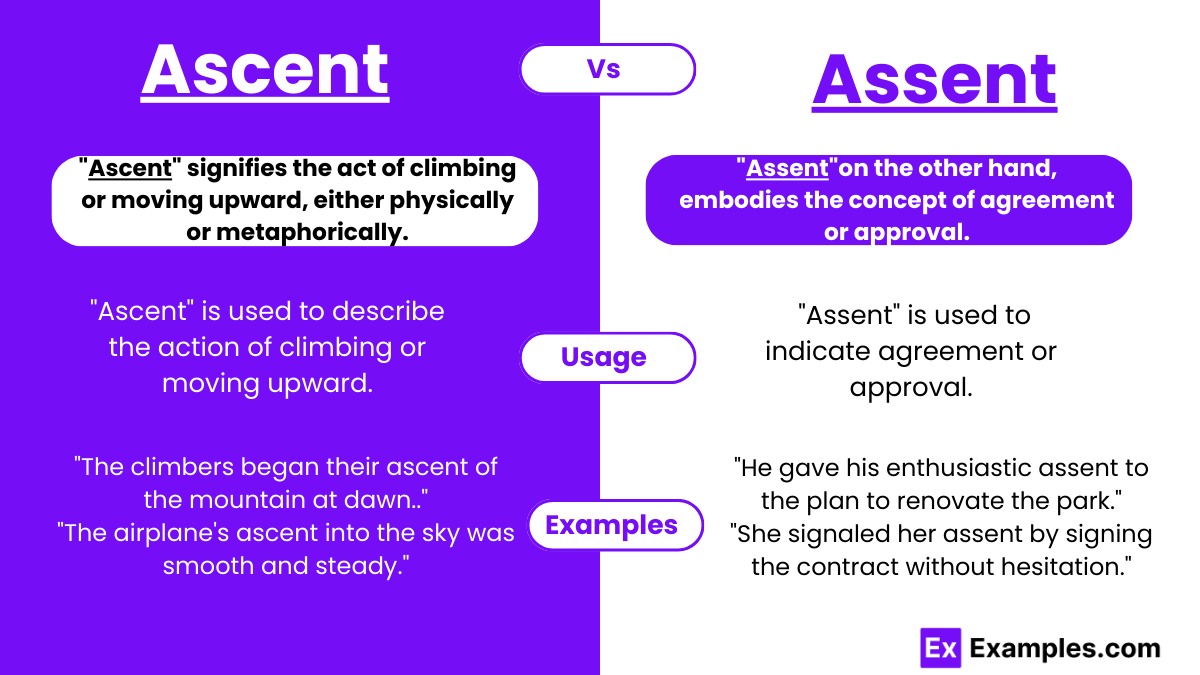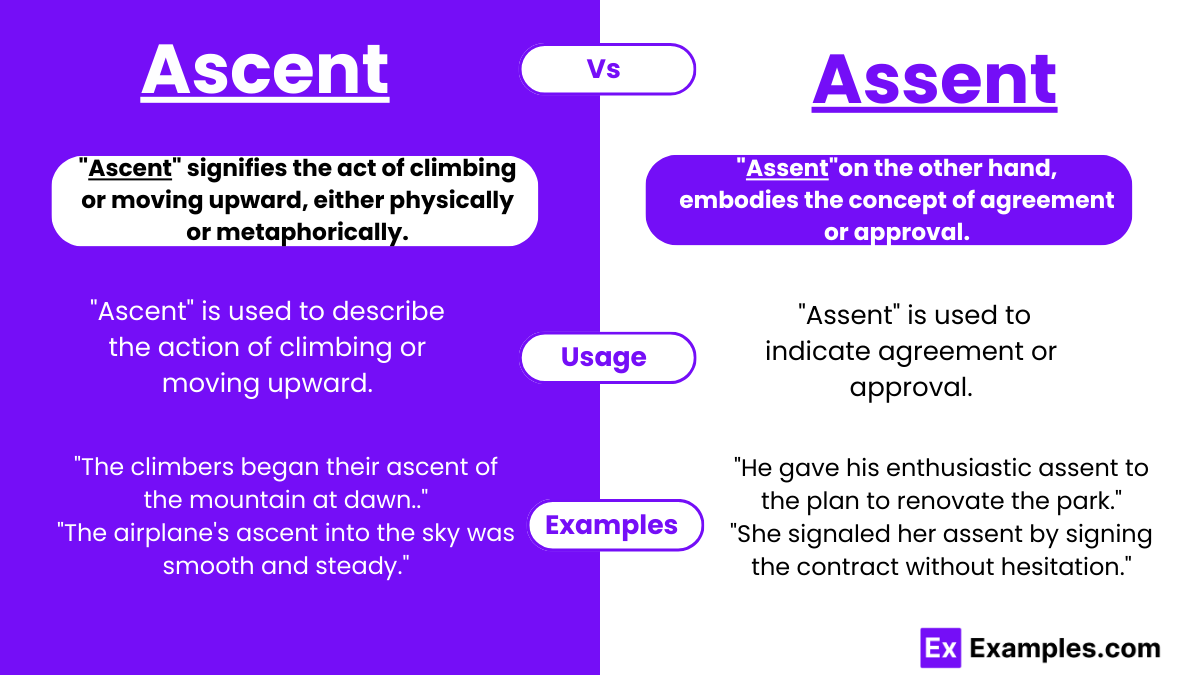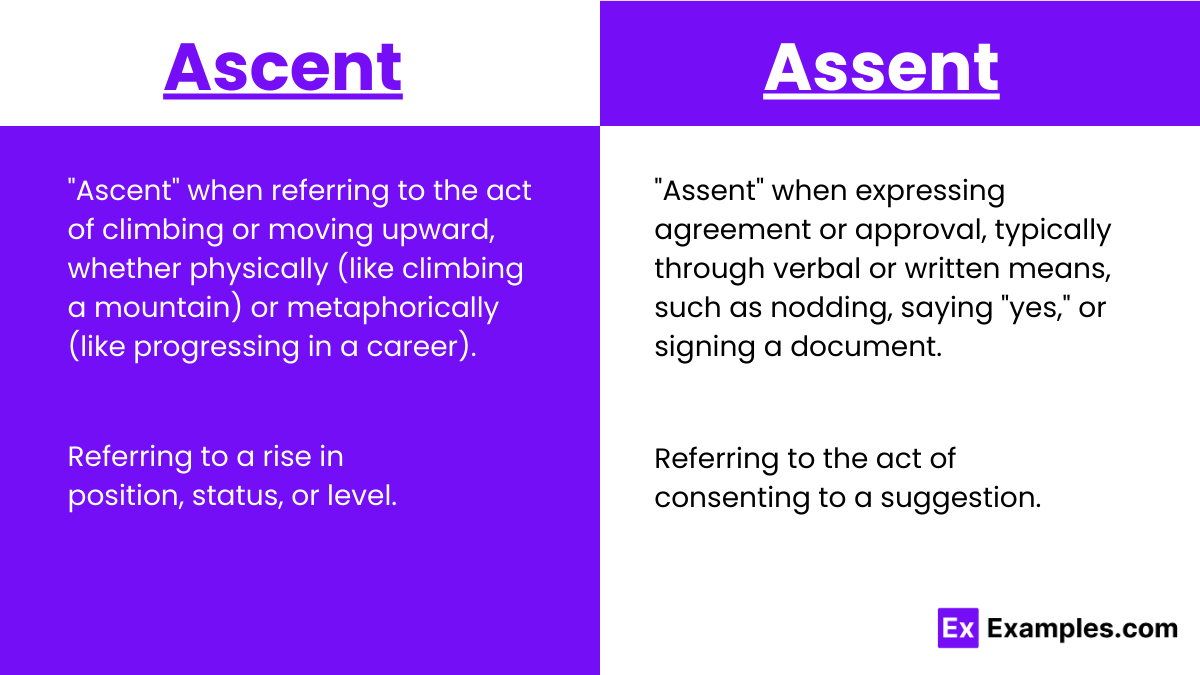Ascent vs Assent – Examples, Differences, Usage
The exploration of “Ascent” vs “Assent” unveils a fascinating aspect of the English language, where two phonetically identical terms diverge significantly in meaning. “Assent,” capturing the essence of concurrence or approval, plays a pivotal role in the realm of agreements and consents, marking the harmonious accord on matters big and small. It’s a term that binds individuals in mutual understanding, serving as the foundation for collective decisions and shared visions.
On the other side of the linguistic spectrum, “Ascent” embodies the physical or metaphorical journey upwards, be it scaling towering peaks or the gradual rise to prominence. It’s a word that evokes images of progress, challenge, and elevation, often associated with the literal climb of a mountain or a figurative journey towards personal growth. Understanding the distinct pathways these words navigate not only enriches one’s vocabulary but also sharpens the precision in communication, essential for any student mastering the art of language.
Ascent and Assent – Meanings
Ascent: Ascent signifies the act of climbing or moving upward, either physically or metaphorically. In a physical sense, it refers to the act of rising to a higher point, such as scaling a mountain or ascending stairs. Metaphorically, it can represent a rise in position, status, or achievement, like the ascent of an individual’s career or personal growth. The term evokes images of progress, elevation, and the overcoming of obstacles, embodying the journey towards reaching new heights or achieving goals through perseverance and effort.
Assent: Assent on the other hand, embodies the concept of agreement or approval. It can function as both a noun, denoting the act of agreeing, and a verb, meaning to give one’s consent or approval. Assent is often used in legal, formal, or decision-making contexts, where it signifies the concurrence of opinion or the acceptance of a proposal. It implies a voluntary acknowledgment and acceptance of an idea, policy, or directive, highlighting the collaborative aspect of reaching a consensus or endorsing a course of action.
Summary
Assent embodies the notion of consent or accord, whereas ascent is synonymous with an upward journey. Prior to embarking on a summit attempt, such as conquering Everest, it’s crucial to secure the concurrence of our guide for the upward endeavor. A mnemonic to distinguish these similar-sounding terms is to associate the ‘c’ in “ascent” with “climbing,” and the double ‘s’ in “assent” suggests a mutual “yes” or agreement.
Difference Between Ascent and Assent
“Ascent” and “Assent” are distinct in meaning despite their similar sound, crucial for clear communication.
| Aspect | Ascent | Assent |
|---|---|---|
| Meaning | Upward movement | Agreement |
| Context | Physical or metaphorical rise | Approval or consent |
| Usage | Climbing or advancement | Agreeing or approving |
| Part of Speech | Noun | Noun/Verb |
| Related Words | Ascend, elevation | Agree, consent |
| Examples | Mountain ascent | Nod in assent |
| Mnemonic | ‘C’ for climb | ‘S’ for say yes |
| Fields | Geography, career growth | Law, decision-making |
| Nature | Physical/Abstract | Conceptual |
| Opposite | Descent | Dissent |
Examples of Ascent and Assent
Understanding “Ascent” and “Assent” through examples illuminates their distinct usages and contexts.
Ascent Examples:
- The mountain climbers began their ascent at dawn.
- His rapid ascent in the company surprised many.
- The balloon’s slow ascent captivated the crowd.
- She faced a steep ascent on her hiking trail.
- The novel charts the protagonist’s ascent to fame.
Assent Examples:
- The committee gave their assent to the new policy.
- He nodded in assent to the proposed plan.
- Without her assent, the project couldn’t proceed.
- The treaty received assent from all parties involved.
- She murmured her assent, agreeing to the terms.
When to Use Ascent and Assent
Deciding between “Ascent” and “Assent” is based on the context of rising or agreement:
-
Usage of “Ascent”
- Describing a physical climb or upward movement.
- Referring to a rise in position, status, or level.
- Discussing an increase in numerical or qualitative terms.
-
Usage of “Assent”
- Indicating agreement or approval, either verbally or through action.
- Referring to the act of consenting to a suggestion or plan.
- Describing a formal approval or sanction by a governing body or official.
- Using in legal or formal documents to denote agreement.
FAQs
What Word Is Confused with Ascent?
The word often confused with “ascent” is “assent.” While “ascent” refers to an upward movement or climb, “assent” denotes agreement or approval, showcasing the importance of context in their usage.
What Does Ascent Mean in Approval?
“Ascent” does not relate to approval. It signifies a rise or upward movement, such as climbing a hill or advancing in a career. For expressions of agreement, the correct term is “assent.”
Is Assent a Legal Term?
Yes, “assent” is used in legal contexts to denote agreement or approval, especially regarding contracts, proposals, or legislative acts. It signifies a formal acceptance or sanction in legal terms.
Does Assent Mean Agree?
Yes, “assent” means to agree or give approval. It can be used both as a noun, indicating the act of agreeing, and as a verb, meaning to express concurrence or approval explicitly





